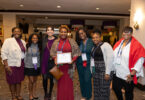Editor’s note: In celebration of Black History Month in February, PRSA invited prominent black leaders in the public relations profession to offer their views and ideas for achieving greater racial and ethnic diversity in the profession. This is the second post in the series. Previous PRSA Black History Month blog posts can be found here.
With February marking Black History Month in America, it’s worth examining the state of diversity in public relations, a profession that like many others, has had fits and starts when it comes to progress made toward racial diversity.
Black practitioners have been performing PR duties for nonprofits, social movements, corporations and other institutions for decades. Like every group, African Americans practiced public relations before the anyone even bothered to call what we do “public relations.” For example, anti-slavery associations used emotional appeals and testimonials to persuade audiences about the evils of slavery.
In the 20th century, there were several pioneering practitioners who dared to find their own space in the profession by starting their own firms, landing prominent clients eager to build relationships with non-majority audiences, becoming well-regarded counselors, and challenging the derogatory images of African Americans that were prevalent at one time in our nation’s history.
African-American practitioners are still in the public relations trenches. It may appear that present-day practitioners have little in common with those who preceded us. We have a president who claims his African-American heritage; Black men and women are CEOs of global companies. Although this is true, there remains a layer of invisibility for Black practitioners and other practitioners of color.
A 2010 census of PRSA’s 22,000 professional members shows that 14 percent of the membership self-identified as Hispanic, Black/African American, Asian/Asian American. That percentage has doubled since 2005.
In a report given at the PRSA Educators Academy Conference, Bey-Ling Sha, Ph.D., and I noted that “a very real possibility exists that minorities are not entering the public relations profession because the industry has failed to explicate to professionals the viability of this career option.” As a professor, I have seen this firsthand. I encounter students of color who question if there is room for them in this profession because they do not see others who look like them in the places where they wish to work.
When it comes to our external outreach to stakeholders, it is imperative that all public relations practitioners embrace core multicultural competencies. Any practitioner who works with multicultural and diverse audiences (i.e., the majority of us who work to enhance relationships between institutions and stakeholders) should be aware of how their own background may shape their perspectives and attitudes about other cultures. This awareness is increasingly important as the U.S. continues to diversify and as our clients and organizations must reach and engage diverse audiences within our society.
What the Future Holds for Black PR Professionals
More work must be done to encourage African Americans into the profession, to retain Black practitioners and to promote African Americans into senior-level positions within corporations and agencies. Public relations professional associations have a special role to play in promoting diversity in the industry.
For two decades, PRSA has led a dedicated initiative to recruit practitioners from diverse backgrounds into public relations.
Although the effort has shifted and restructured, its mission remains the same: to promote a workforce that more closely mirrors the communities in which we live and work in terms of age, race, ethnicity and gender. Our members understand that increasing diversity within the profession will be key to their organizations’ success in the year to come, as businesses continue to seek a more global perspective to their communications initiatives.
The road ahead for African-American public relations professionals is promising, but much work remains. PRSA is committed to engendering a more diverse profession. During Black History Month and beyond, we hope our colleagues through the profession will stand beside us to ensure this becomes a reality.
Natalie Tindall, Ph.D., is chair of PRSA’s Diversity Committee and an assistant professor of communication at Georgia State University. A version of this post was originally published in Ragan’s PRDaily.







It’s refreshing to read the above-mentioned article! I just graduated from Tulane University with my BA in Public Relations and still no offers.
[…] […]